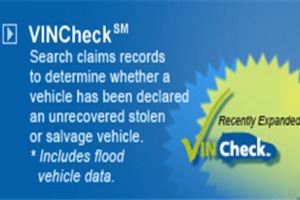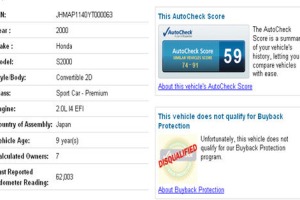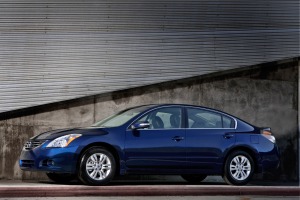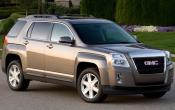Which Vehicle History Report Is Right for You?
Edmunds.com Test-Drives Carfax, AutoCheck and the NICB

Not long ago, Carfax vehicle history reports had little competition. Then in 2002, credit giant Experian launched its own vehicle history report division called AutoCheck.com. And more recently, the National Insurance Crime Bureau's (NICB) VinCheck.org began offering free checks to alert buyers to a limited number of used car problems.
Since these services differ significantly, we decided to test-drive all three with real vehicle identification numbers (VINs). Before you read any further, you might want to take a look at "Vehicle History Report: Your Key to a Good Used Car". In a nutshell, vehicle history reports are the most accurate window into a used car's possibly checkered past. By tapping multiple databases, problems such as odometer rollback, salvage titles and accidents can be revealed.
VinCheck — Valuable but Limited
VinCheck was recently introduced as a free service by the NICB and grabbed headlines for a short time. Its reports reveal if a car has been reported stolen or if it has a salvage title (which means it was declared a total loss by an insurance company for a variety of problems, typically a serious collision).
VinCheck isn't really in the same category as AutoCheck and Carfax. While it notifies a potential buyer of important problems (theft, salvage title and, in some cases, flood damage), it is not as comprehensive or user-friendly. It is free, however, and could be considered a first step in the buying process.
AutoCheck Throws a Wide Net
With Experian credit services behind AutoCheck.com, one might expect its reach to be global or perhaps even intergalactic. In actual numbers, "we have north of 550 million vehicles in our database," said Edie Hirtenstein, senior product manager for AutoCheck. She estimated that AutoCheck runs some 16 million vehicle history reports per year for consumers.
AutoCheck offers a single report for $24.99 and an "unlimited" number of reports for 60 days for $39.99. For $59.99, you can add insurance to the unlimited package; this coverage offers protection of up to $50,000 against losses resulting from defective vehicle titles for as long as you own your car. AutoCheck offers buy-back protection and promises to purchase the vehicle if its report missed something serious (be sure to read the fine print).
On AutoCheck.com, after you enter a VIN, a report is displayed immediately. The information is well organized under major headings, including Title and ProblemCheck, OdometerCheck, Vehicle Use and EventCheck, and Full History.
One unique feature is the AutoCheck Score for similar vehicles. At a glance, this provides a specific number to rate desirability compared to other cars. For example, the range for used Honda S2000 models was 74-91 (out of 100). However, the specific Honda S2000 we ran scored only a 59 because it had a salvage title.
"The vehicle score leverages the Experian data," said Hirtenstein. "It makes the report simple to understand" and "provides confidence to buyers to let them compare similar vehicles." She described it as "a credit score for cars."
Carfax — the Industry Standard
Carfax began by faxing vehicle history reports to customers in 1986. It owned this market for many years, and its reports have a high level of sophistication. Like AutoCheck, Carfax reports a variety of major problems encountered with a used car. A single report costs $34.99, or you can buy 5 for $44.99. Carfax also offers a "Buyback Guarantee" in case it misses a serious problem (again, read the fine print).
What distinguishes Carfax from the competition is not just the data it provides, but the way it is organized and interpreted. For example, one online report had what appeared to be an odometer rollback. A little Carfax figure popped up with a speech bubble guiding the reader through the understanding of the severity of this issue: "Hmmm...hard to tell whether this reading represents an odometer rollback or a clerical error. Confirm the mileage with your dealer or qualified mechanic." In other words, don't discount the car; human interpretation is required.
Chris Basso, spokesman for Carfax, said "more than 22,000 sources across North America report information to Carfax. Our database, comprising more than 6B [billion] unique vehicle records, is the largest vehicle history database ever assembled. Every day, we load 3-4 million records into our database."
When asked what differentiated Carfax from AutoCheck, Basso simply answered, "For more than 20 years, our singular focus has been on vehicle history information. Carfax pioneered the concept of the vehicle history report to make this vital information readily available."
The Comparison Test: What Did They Catch?
Price and presentation aside, what did the services uncover about the cars we looked at? We ran the VINs of several cars we knew had salvage titles through all the services. They all flagged the problem but had a different number of "events" in the car's history.
On the same car, a model-year 2000 Honda S2000, AutoCheck found nine events. Not only did Carfax find a total of 12 events, but it flagged a potentially serious problem with a speech bubble that read: "This car seems to have been registered in CA [California] without the prior SC [South Carolina] salvage title. This may be a case of title washing." No mention of title washing occurred in the AutoCheck report.
On another vehicle, previously owned by Edmunds.com for testing, the Carfax report had a very detailed listing of all the service performed on it at local dealerships. This is valuable information for a potential buyer, which the AutoCheck report did not provide.
What Do the Experts Say?
Buyers at the used car superstore Carmax use AutoCheck as a routine part of the process. David Claeys, purchasing manager for the Richmond-area stores, said AutoCheck seems to be very accurate.
"There's been tons of examples for me personally where I'm out at a car appraising it and I'll think, 'I'm going to pull AutoCheck, and it will have a salvage history.' Nine times out of 10 it does." However, AutoCheck is only part of a process. "What's more important for us is the physical appraisal our associates are doing."
While Oren Weintraub, president of Authority Car Buying Specialists in Los Angeles said Carfax "is a key element of considering a car for a trade-in," he had a word of caution. "The one issue is it only tells you what is reported — and not everything that has occurred. You still need to do your due diligence."
The one expert we contacted who had a real preference for one of the services was Brian Crane, president of DRC Leasing Inc., in Woodland Hills, California. "Both companies are doing a pretty good job of keeping the public informed about what's going on. But I believe AutoCheck does a little better job. I've had things come up on AutoCheck that didn't come up on Carfax."
He added, "Unfortunately in the car business, private parties lie as much as dealers and this [a vehicle history report] is something that keeps everyone honest."
The Final Word
Aside from the free but limited information from VinCheck, AutoCheck appears to be the better bargain while Carfax provided more information about the cars we checked. However, discounts are offered on each of the services from outlets such as AAA and on eBay. While consumers may prefer one vehicle-checking service to another, it is clear that this is a quickly evolving field and a powerful tool for used car buyers.









